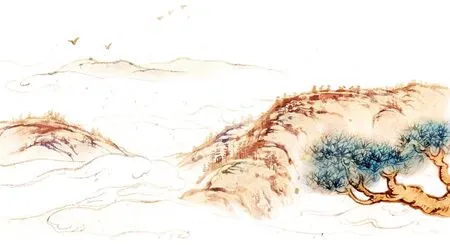History Foretells the Future
By Jiang Peng
Living through the Southern and Northern Dynasties(420-589) to the Sui Dynasty (581-618) in ancient China,Yan Zhitui (531-597),a scholar-official who grew up in the Southern Liang Dynasty (502-557),had a life full of turbulence and unpredictability.He witnessed the most prosperous heyday of the state in his youth.Yet,after the outbreak of the Hou Jing Rebellion (548-552),the once mighty Liang State soon collapsed,and the Western Wei Regime which occupied northwestern China (535-556) took advantage of the opportunity and came to loot Liang.Yan was then captured.
Ironically,it was just two years later that the Western Wei also fell apart and gave way to the Northern Zhou State (557-581).In the chaos of the political coup,Yan braved formidable difficulties to flee from the Northern Zhou to the Northern Qi State,whose land covered the Northern Plains in China,where he spent his stable and peaceful life for twenty years or so;but that was not the end.In 577,Yan found himself a captive again when the Qi Dynasty was conquered by the Northern Zhou.History always repeats itself in a similar form.After only four years of ruling in the unified North,the Northern Zhou was toppled by Yang Jian,also known as Wendi Sui (literally meaning “civil emperor,” a kind of symbolic name often posthumously conferred on emperors),who became the founding emperor and began the reign of the Sui Dynasty (581-618).
南北朝至隋朝期间,出生于南方梁朝的士大夫颜之推,人生经历丰富,年轻时,他目睹了南朝最为繁华的时光。随着“侯景之乱”爆发,南朝繁华付诸东流,之后不久,梁朝也灭亡了。征服者是来自北方关中地区的西魏政权,颜之推被西魏军队俘获。
有趣的是,短短两年后,西魏也灭亡了,被一个叫北周的政权取代。颜之推趁机逃离,历经千辛万苦,来到华北平原的北齐国。颜之推在北齐大概过了二十年的安稳日子。随后,北齐被北周灭,他再度做了亡国奴。历史总是惊人的相似,戏剧性的事件再次上演,灭北齐统一北方才四年功夫,北周政权也被隋文帝杨坚降服,隋朝统治历程开启。
颜之推一生经历过梁朝、西魏、北齐、北周、隋五个朝代,并目睹其中四个政权的灭亡。这样复杂的人生经历,让颜之推看到了很多常人看不到的东西,于是他将乱世中的感悟写成一本名叫《颜氏家训》的书,希望这些经验教训能帮助他的子子孙孙洞明世事,健康成长。
《颜氏家训》里有这样一个故事。颜之推生活在北齐的时候,有一位士大夫对他说,他有一个儿子,十七岁,学习不错,想让他学习鲜卑语,弹弹琵琶。颜之推知道,士大夫之所以这么要求儿子,是因为当时北齐最高的统治阶层是鲜卑贵族,说的是鲜卑语,而且北齐皇帝很喜欢琵琶。说鲜卑语、弹琵琶,就是为接近、服侍达官贵人,投其所好。
听完之后,颜之推没说什么。之后,他把这件事记录在《颜氏家训》里,感叹道,这人怎么会这样教育孩子呢?他告诫自己的后代,千万不要这样做。靠服侍人搏出位,首先独立人格没有了,更何况把这些达官贵人伺候得再好也未必就能当大官呢。
那么,这位士大夫和颜之推的分歧在哪里?
这位士大夫认为,讨好眼前的贵人,自己就有机会飞黄腾达——这是很多人都容易有的想法。颜之推却质疑说:你眼前的贵人,将来会一直是贵人吗?你为了讨好他,甚至连独立的人格都不要了,万一有一天他被打翻,成为阶下囚,先不说你会不会受连累,你曾经的付出在那个时候还有什么价值吗?还能得到什么回报呢?
As a man that lived through five dynasties,Yan saw the downfall of four of them.
His bitter suffering as a refugee and unconventional encounters taught him a lot.Therefore,he wrote a book named “Family Instructions for the Yan Clan,”recording his reflection upon the troubled times in the hope that generations of his descendants would know the world better and grow up well in light of the book.
One of the stories from the book goes as follows:When Yan lived in the Northern Qi,a peer scholarofficial told him that he wanted his talented son of 17 to learn the Xianbei ethnic language and the pipa,a four-stringed Chinese lute.Yan knew well what his purpose was.As the ruling class then,the Xianbei aristocrats did not speak Mandarin Chinese,and as the emperor himself was a pipa enthusiast,by doing so,the man could please the Xianbei Nobles who,in return,might help his son gain more power.
Yan didn’t say a word during the conversation.However,he wrote it down in the book later,sighing:how could the man teach his sons like this? Yan then warned his descendants not to do as this man did.He suggested that if you were keen on rising high in the political hierarchy by currying favor with people of influence,you would lose your personality of independence,and you wouldn’t necessarily get promoted through servile flattering to superiors.
Then,on which points did the man and Yan differ?
Practically,the man believed that one could attain prominence by courting,even flattering,dignitaries—a popular belief among many people.Yan,however,raised an opposition:Could the nobleman you serve stay in power forever and always come to your favor? By pleasing him,you risk the loss of your personality and independence.If someday they lost power and ended up as prisoners,what would you think you could earn from your efforts?Worse still,you might even get pulled into the political turmoil.
Ideologically,the scholarofficial’s education approach stems from the doctrine of utilitarianism,which means gaining immediate benefits regardless of possible costs,sacrifices,and complications in the future.Although the problem of that approach seemed to be due to the lack of foresight,it actually stems from a short view of history.If we draw a timeline and consider the present as a starting point,then,on the left side is what has already happened,i.e.the history;and on the right is what has not yet happened,i.e.the future.History and the future are symmetrical.The more you know about history,the acuter your judgment for the future will be.
Yan was a wise man with excellent judgments and rich life experiences.Before fleeing to the Northern Qi,he had already witnessed the rise and fall of two dynasties:Liang and the Western Wei.He found it was not uncommon to find examples in which a person who enjoyed an unshakable social status being reduced to the misery as prisoner.He recollected the cases,and summarized his reflections into some useful empirical knowledge and insights,in order to guide his sons and grandsons to make predictions and judgments that would lead to a good life.This makes Yan’s wisdom extraordinary.According to his analytical logic,since the status and power of your superior are not guaranteed,how can you assure that the superior wouldn’t become a man behind bars tomorrow?

If we happen to live in troubled times,we surely cannot resign ourselves from the national tragedies rendered by the troubles in history.But at any time,we always need self-reliance and to stay true to ourselves.Even if we are destined to a life in exile,we should hold firm to our own life in our hands,and should never rely on others who might drag down our life.
Yan’s wisdom came from his reflections on history.So,this is why we say history can foretell the future—and why we can always learn from history.
(FromFamily Business,April 2019.Translation:Wang Wen)
这位士大夫的教育理念,其实就是功利主义思想:只顾眼前,忽视了未来的复杂性。这种思想,看上去是对未来缺乏前瞻,究其根本,实则是对历史缺乏洞察。如果把时间画成一条线,以当前所处的时间为原点,在它左边,是已经发生的事,是历史;在它右边,是尚未发生的事,是未来。历史和未来是对称的。你对历史的理解有多深,对未来的判断就有多敏锐。
颜之推见多识广,阅历丰富。来到北齐之前,他目睹了梁朝和西魏两个王朝的灭亡,昨日风光无限,今日却沦为阶下囚的凄惨人生,并不少见。将这些丰富人生经历通过反思升华成生活经验,再把眼光投向未来判断世事变化,颜之推自然比常人更为睿智。既然富贵不可常保,如何能知今日所服侍的贵人不是明日的阶下囚呢?
人若不幸遭遇乱世,固然很难抗拒滚滚历史大潮席卷之下的命运;但无论何时,人都可以选择自立自强,做真正的自己。即便无法改变流离的命运,也要把人生掌握在自己手里,千万不要轻易把未来交托给他人。
颜之推的睿智,来自对历史的总结,所以说历史中隐藏着未来。
(摘自《家族企业》2019年第4 期)

